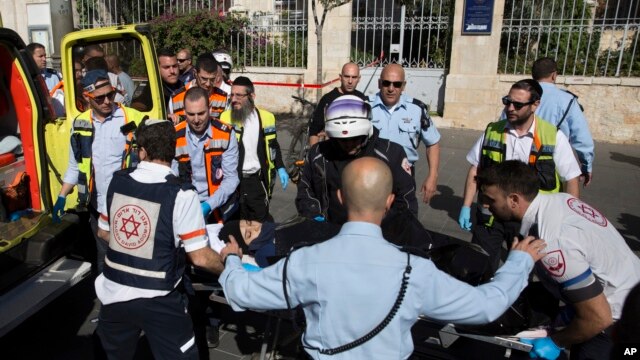
Kerry Says He Has ‘No Doubt’ IS Will Be Defeated
Last updated on: November 23, 2015 1
Speaking to NBC’s «Today Show» during a visit to Abu Dhabi in the United Arab Emirates, Kerry said there is a strategy in place and that the United States, which is leading a coalition of airstrikes against IS, is escalating its efforts.
He also said terrorists who carried out attacks in France, Lebanon and Egypt were attracted by what the group’s fighters are doing in Iraq and Syria, and that he expects coalition attacks in those two countries to increase in the coming days.
At the same time Kerry said there is “no question” he would like to see U.S. efforts to fight IS move faster, but President Barack Obama has to make the decision as to which options to exercise.
His remarks in Abu Dhabi came as he was holding talks with UAE and Saudi officials on efforts to defeat the militant group.
Three-pronged strategy
Kerry outlined a three-pronged strategy against IS that includes a military effort, a cooperative effort with other countries to address regional stability and the refugee crisis, and a third diplomatic effort that has included negotiators with world powers in Vienna.
“We are working very hard to accelerate the efforts out of Vienna to give that diplomatic process life,” Kerry said.
Earlier this month, foreign ministers and other officials meeting in Vienna agreed to try to bring Syrian government and opposition representatives into U.N.-mediated talks by early January.
FILE – Russia’s Foreign Minister Sergei Lavrov, top right, U.S. Secretary of State John Kerry, top center, and other foreign ministers attend a meeting in Vienna, Austria, Nov. 14, 2015, to find a way to resolve the conflict in Syria.
They also voiced support for a plan that would establish credible and inclusive governance in Syria within six months, and free and fair elections in 18 months.
UAE Foreign Minister Abdullah bin Zayed said he and Kerry had a “very fruitful” meeting.
The United Arab Emirates is part of both the Vienna talks on a political transition in Syria and the U.S.-led coalition that has been launching airstrikes against IS militants in Iraq and Syria.
Kerry also met with Crown Prince Sheikh Mohammed Bin Zayed and Saudi Foreign Minister Adel al-Jubeir.
The talks come on the heels of the deadly terrorist attacks in Paris, for which IS claimed responsibility, and a huge security operation in Belgium that has resulted in an unprecedented lockdown in the capital, Brussels.
In Washington, Vice President Joe Biden joins senior diplomatic representatives from 65 members of an anti-Islamic State coalition at the State Department, reviewing progress made and discussing how to expand efforts to bring down this terror group. The U.S.-led Global Coalition to Counter ISIL was formed about a year ago. It includes members from the European Union, countries from Asia, Africa, Middle East such as United Arab Emirates and Iraq.
Simmering Israeli-Palestinian tensions
From Abu Dhabi, Kerry travels to Israel for talks with Prime Minister Benjamin Netanyahu and Palestinian President Mahmoud Abbas on spiraling violence between Israelis and Palestinians.
On Monday, the unrest included an attack in which Israeli officials said two women with scissors stabbed a man before they were shot by police officers.
Violence during the past two months has resulted in the deaths of at least 18 Israelis and 80 Palestinians, many of them perpetrators of knife assaults against Israelis.
On Monday, Kerry said his visit is an effort to get some “concrete steps” in place to calm the situation so “people are not living in absolute, daily terror that they might be stabbed or driven into or shot trying to walk around their city.”
Israeli medics move a Palestinian woman, who police believe attacked a man, at the scene of a stabbing attack in Jerusalem, Nov. 23, 2015.
Brookings Institution Middle East analyst Khaled Elgindy said he was uncertain whether Kerry could make progress “given the inclination of this particular Israeli government, which is very right-wing, very much committed to the settlement project.”
Palestinians have been angered over what they view as Jewish encroachment on a holy site in Jerusalem that is sacred to both Muslims and Jews.
They were further incensed by an Israeli government decision to allow more settlement construction on occupied land.
During his meetings with Palestinian leader Abbas, Kerry is expected to discuss measures that could improve the situation, and U.S. officials said he will urge both sides to exercise restraint.
VOA State Department correspondent Nike Ching contributed to this report



